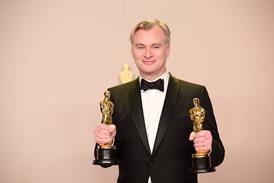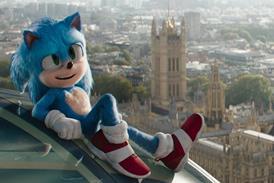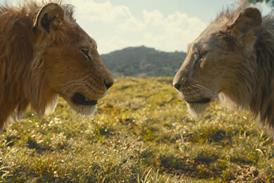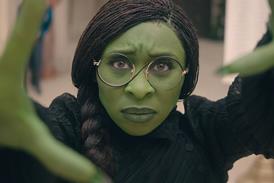China’s continued growth, the Eurozone crisis and the ongoing debate about release windows made the past year a tumultuous one for the global film business. Screen revisits 10 game-changing stories of 2012.
Booming China
In February, China finally agreed to expand its annual quota of 20 foreign imports, adding 14 films in the Imax or 3D formats. The move was music to the ears of Hollywood studios keen to capitalise on the booming Chinese market. Box office doubled in the territory between 2009 and 2011 to hit $2bn, and in 2012 China is challenging Japan as the biggest international marketplace, with the Chinese box office earning $2.3bn from January to November. The boom is set to continue, with 25,000 screens to be installed in the territory over the next five years, many with the latest 4k digital technology. Predictably, asking prices for Chinese rights to US product skyrocketed at this year’s AFM. China’s strength was also underlined in 2012 when Dalian Wanda Group became the world’s biggest exhibitor after its $2.6bn acquisition of US multiplex operator AMC.
Indie power
Major independent hubs continued to mount studio-scale projects in 2012, willing to take risks their counterparts at the US majors will no longer contemplate alone. Megan Ellison’s Annapurna Pictures backed Zero Dark Thirty and The Master, while others attempt to make similarly splashy plays. Red Granite, backed by Malaysian money, is behind The Wolf Of Wall Street, budgeted in the region of $120m, with Martin Scorsese directing Leonardo DiCaprio. And Cloud Atlas was made this year for $100m and is independently financed (although Warner Bros was on board with a reported $25m deal for North America). Even Ron Howard is making his first indie film, Formula 1 story Rush, with Working Title, Revolution and Imagine.
Skyfall chalks up firsts
It started by delivering the biggest first week in UK box-office history at $59.8m (£37.2m) in late October. Then in 40 days it had managed to become the biggest film of all time in the UK, just one of several records Skyfall has broken on its way to becoming Sony’s biggest ever global release. It crossed the worldwide $1bn mark on December 30, by which date the 23rd James Bond mission stood at $161.6m (£99.95m) in the UK. A China release follows in January. Along with The Dark Knight Rises’ $1.1bn haul, the success of Skyfall in 2012 shows 2D is far from a dying format — and that a revamped franchise, this time with the likes of director Sam Mendes, can be an irresistible draw for fans.
Powerhouse mergers
Consolidation is inevitable, and yet two big moves rocked the independent space in 2012. Lionsgate bought Summit in January for $412m and in so doing created an indie powerhouse, but took one major seller off the market. Now that Twilight is over, the combined company has The Hunger Games but may well need another strong franchise to protect its fortunes. Then, in September, eOne confirmed it was acquiring Alliance Films for $230m in a development that removes one buyer in Canada, UK and Spain, but creates a powerful, bigger player.
Digital dominates
Digital continued to revolutionise the film business in 2012, with Fujifilm announcing in September that it would stop manufacturing film stock from spring 2013. Talk of the death of celluloid on set remains premature, however, with a number of film-makers continuing to work on film, led by Christopher Nolan. In the exhibition sector, digital projection is now the industry standard, with penetration hitting 60.2% in the first half of 2012, according to Screen Digest figures. Penetration was 74% in North America and 65% in western Europe. Global audiences also had their first glimpse of higher frame-rate film-making in 2012, with Peter Jackson’s The Hobbit shot at 48 frames per second.
On demand, in demand
Theatrical windows are still not really budging, but there were some dramatic developments in the world of video-on-demand (VoD), including The Weinstein Company’s new multi-platform arm TWC-Radius having great success with a VoD launch a month before the theatrical release of Leslye Headland’s Sundance comedy Bachelorette. The film made a reported $5.5m from VoD, compared with $418,000 theatrically. Roadside Attractions-Lionsgate also had success with Arbitrage launching simultaneously on demand and in cinemas. In the UK, Curzon On Demand launched in April as a forward-thinking initiative from the exhibitor-distributor (it also works with third-party films). Netflix continued its international expansion with operations in the UK, Ireland and Scandinavia. Expect even more experimentation in 2013, although the big exhibitors still show little sign of exploring new models.
Euro recession
While the international marketplace continues to see growth — particularly in the BRIC countries of Brazil, Russia, India and China — the industry has been feeling the knock-on effects of the ongoing Eurozone crisis. “The market is increasingly difficult because of depressed economies, particularly in Europe,” Mister Smith founder and CEO David Garrett told Screen during the AFM in November. The message has been the same at all major markets this year. Greece and Spain have been hardest hit, with buyers shrinking to a trickle at markets, companies having to restructure distribution deals and local box office suffering. Portuguese box office continues to languish and Italy has slumped in the second half of 2012, a depression that contributed to a decline in receipts at the Rome Film Festival. There are rumblings that German TV deals are also on the wane. With little economic respite in sight, the industry must find gains elsewhere.
French invasion
France has long been a European production powerhouse and in 2012 its films took the world by storm. Every man and his dog fell in love with The Artist, which scooped five Oscars in February, including best film and director, while box-office sensation Intouchables has notched up more than $420m at the global box office, making it the biggest non-English-language film since The Passion Of The Christ. The Artist’s success catapulted director Michel Hazanavicius and actors Jean Dujardin and Bérénice Bejo onto major films, while Intouchables star Omar Sy has been signed by CAA. Both films were expertly distributed in the US by a resurgent The Weinstein Company, which also has US remake rights to Intouchables.
Star Wars returns with Disney
In October, Disney signed a blockbuster deal to buy Lucasfilm for $4.05bn. The pact sees Disney add multibillion-dollar franchises Star Wars and Indiana Jones to its portfolio of brands, which already includes Pixar and Marvel. The deal covers all Lucasfilm subsidiaries, including Skywalker Sound and visual effects outfit Industrial Light & Magic. Disney also unveiled new Star Wars films with a 2015 release planned for Episode 7, with Michael Arndt (Toy Story 3, The Hunger Games: Catching Fire) on board to write the screenplay. Robert Iger, chairman and CEO of Disney, is seen here with George Lucas.
The Avengers takes on the world
Disney’s ambitious big-screen teaming of Marvel’s The Avengers could have suffered from audience fatigue, yet it seemed the global audience could not get enough of these superheroes. Following its late April release, The Avengers fought its way to $1.5bn worldwide to become the third-biggest film of all time, behind James Cameron’s formidable one-two of Avatar and Titanic, and perhaps more notably, enjoyed wide critical praise. It was a huge hit on its UK opening, setting it up well for a US launch (another pattern that might be repeated more often). It has set in motion a busy slate of related titles. Before the arrival of The Avengers 2 in 2015, we will see Iron Man 3, Thor 2: The Dark World, Captain America: The Winter Soldier and Guardians Of The Galaxy. Fatigue?Not if Marvel can help it.



















No comments yet